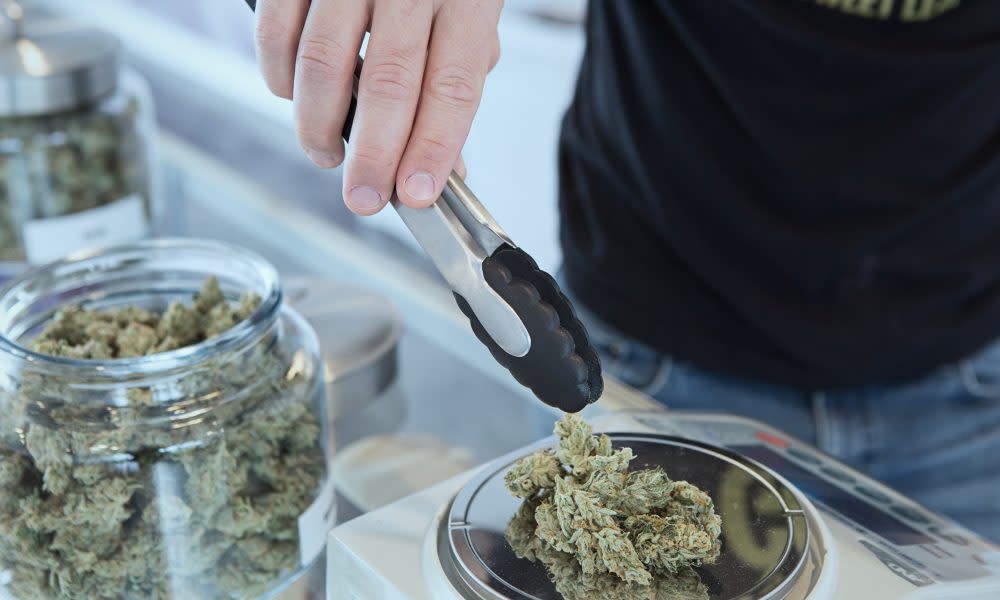Resources
Colorado state tax revenue from the legal cannabis industry surpassed $2 billion in January and the state has collected more than $88.7 million in fees.
In addition to state and local taxes and fees, cannabis businesses have an effective federal tax rate of about 70% – compared to about 26% for other businesses.
Did you know Colorado legal cannabis dispensary owners are unable to deduct normal business expenses like payroll and rent from their federal income taxes?
Marijuana has contributed over $320 Million dollars to Building Excellent Schools Today (B.E.S.T.), making up about 25% of the program's entire budget.
In FY 21-22 alone, nearly $15.3 million in state cannabis dollars went to state Affordable Housing Grant and Loans.
The Marijuana Tax Cash Fund collected $188.8 Million in FY 2021-22 alone.
In FY 21-22 alone, nearly $15 million in cannabis dollars went to the School Health Professional Grant program.
More than $15 million in cannabis dollars went to substance abuse treatment in FY 21-22.
More than $1.6 million cannabis dollars went to the Tony Grampsas Youth Services Program in FY 21-22.
Voters in 59 of 64 Colorado counties voted no on Proposition 119 sending a clear message against raising taxes on cannabis consumers.
Unlike other legalized substances, the marijuana industry has a 97% compliance rate for unauthorized sales.
Unlike alcohol, research has proven you can only get “so high.” Cannabinoid receptors in your brain eventually prevent the body from getting further intoxicated.
Did you know? Since legalization in 2005, teen use in Colorado has remained flat and is below the national average.
According to a recent poll by the Pew Research Center, more than 90% of Americans think cannabis use should be legal.
Did you know? MIG represents more than 400 cannabis business licenses across the state.
A 2021 study found that medical cannabis use was associated with clinical improvements in pain, function, and quality of life with reductions in prescription drug use.
Founded in 2010, MIG is the oldest and largest trade association for licensed cannabis businesses.
Colorado’s marijuana model has become the example for all other regulated cannabis states, and MIG works directly with policy makers to ensure that Colorado’s program is fair, tightly regulated, safe, and successful.
Safe Sales: Every marijuana sale in CO takes place on camera and requires multiple ID checks.
All regulated marijuana in Colorado is tracked from “seed to sale,” with oversight from the Marijuana Enforcement Division.
Established in 2010, MIG has led legislation for child resistant packaging, customer safety resources, and purchase restrictions for 18-20 year olds.
Marijuana is taxed at both state and local levels. This year Aurora built a new $34 Million dollar rec center, fully funded by local marijuana taxes.
The marijuana industry suffers from unfair Federal tax rules, which means that MIG members’ effective tax rates are around 71%.
A 2019 study showed that crime does not increase with legalization.
Conditions for medical marijuana
Cancer - Glaucoma - HIV or AIDS - Cachexia - Persistent muscle spasms - Seizures - Severe nausea - Any condition for which a physician could prescribe an opioid - Autism Spectrum Disorder - Severe pain - PTSD
Most marijuana businesses have access to banks, but because marijuana is still federally illegal, businesses are unable to access merchant processing services such as VISA or Mastercard.
Consuming higher potency marijuana does not lead to higher levels of impairment.
-- Journal of the American Medical Association (JAMA) 2020
71% of Colorado voters favor marijuana legalization. This has increased 10 points in the last four years alone.

Marijuana Industry Group Responds to Drop in Cannabis Sales
MIG Press Release
FOR IMMEDIATE RELEASE
DATE: April 13, 2022
CONTACT: Madeleine Schmidt
Marijuana Industry Group Responds to Drop in Cannabis Sales
Medical marijuana sales drop 37% in February as industry grapples with high taxes and increasing regulations
DENVER – Sales figures released Monday by the Colorado Department of Revenue show a steep drop in cannabis sales for the month of February, continuing a troubling trend for a critical Colorado industry. Medical sales in particular are plummeting as business owners and consumers grapple with ever increasing taxes and regulations.
The state recorded $145.3 million in total sales for recreational and medical marijuana in February of this year compared to $167 million in February of 2021, a 13% drop. Medical sales in particular plummeted, with the state recording $20.3 million in medical sales for February of this year compared to $32.5 last February, a 37% drop.
“These sales figures reflect what we hear from our members every day – that small cannabis businesses are struggling to keep up with sky high taxes and regulations that make it difficult to do business in Colorado.” said Tiffany Goldman, Board Chair of the Marijuana Industry Group. “As a mother and small business owner myself, I am particularly troubled by the drop in medical sales and that we are making it increasingly difficult for Coloradans who rely on medical cannabis to access the treatment they need. We cannot overregulate the industry out of existence and deny life-saving medicine to patients.”
A new law that went into effect at the beginning of the year is impacting the medical market, making it much harder for patients to access life-saving medicine. While this new law may have been well-intentioned in keeping cannabis out of the hands of young people, it has had devastating consequences for patients, medical clinics, and doctors who offer critical treatment for Coloradans with difficult-to-treat conditions.
Cannabis sales dropped significantly in January as well. The state recorded $151.1 million in sales for January of this year, a 19% drop compared to January 2021. In particular, medical marijuana sales dropped by nearly 40%.
Small cannabis businesses in Colorado are facing serious financial challenges including a state tax rate of 30% in addition to local taxes and fees, a federal tax rate of over 70%, and a growing list of regulations that are costly and time-consuming to comply with. In January, revenue from the legal cannabis industry surpassed $2 billion, funding which was used to construct and repair schools, support mental health and addiction programs, and fund public safety, health care resources, and education.
“I’m proud of the critical contributions our state’s cannabis industry has made to causes Coloradans care about like education, mental health care, and public safety, but the reality is that small businesses are being stretched to a breaking point,” Goldman said. “We need to ensure Colorado cannabis businesses can stay afloat, keep generating tax revenue, and provide critical treatment to medical patients for many years to come.”
###
About MIG: MIG was founded in 2010 by cannabis business owners and supporters who wanted to help craft Colorado’s earliest medical marijuana regulatory framework. MIG is the oldest and largest trade association for licensed cannabis businesses. Comprised of approximately 400 licensed businesses, MIG has strong representation and connections across the state. MIG advocates on behalf of the rapidly evolving needs of the regulated marijuana industry in Colorado with a reputation for innovative policy making and getting results for the state’s cannabis community.
Additional Info
Media Contact : Madeleine Schmidt, madeleines@strategies360.com








